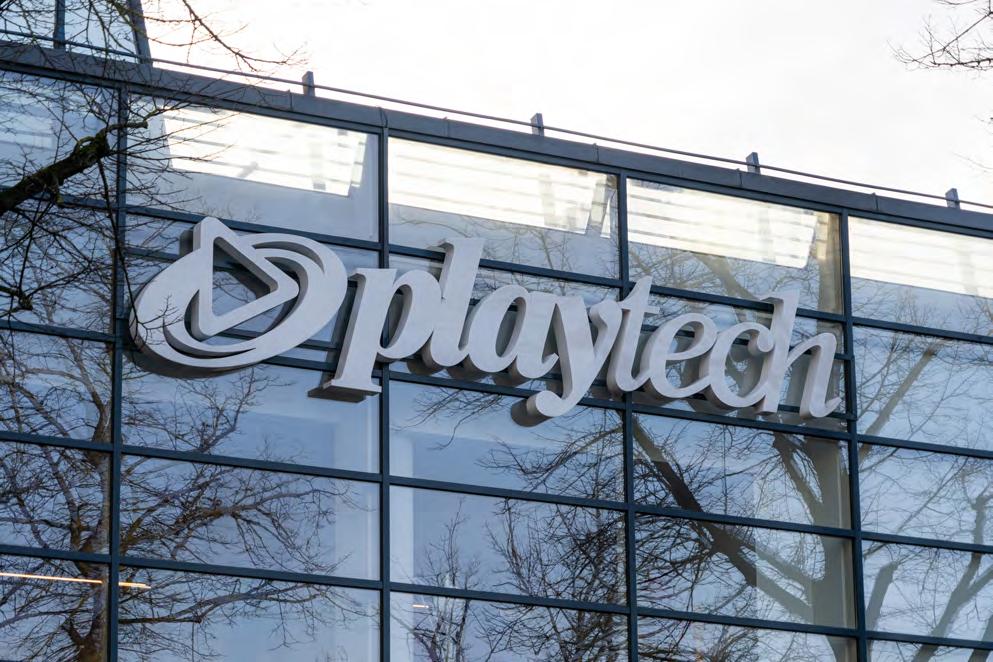
46 minute read
Sports Betting
from SBC Leaders Issue 13
by SBC Global
MEDIA AND BETTING BUSINESSES IN THE US FEED EACH OTHER
SPORTRADAR CONTINUES TO EXPLORE the intersection between media and betting in the US market, said Arne Rees, who explained why the foresight it had about the knowledge exchange between both sides of the business means the two now 'feed each other' to build engaged audiences
The new regional CEO for North America also discussed how the rollout of 5G will influence business in the US, where Sportradar expects both mobile and in-play betting to grow +700% over the next 10 years.
SBC: Sportradar has consistently been at the forefront of technology. Which technology trends will have the greatest impact on Sportradar’s US business in the near future?
AR: As the leading global multivertical data and technology company in sports, Sportradar consistently redefines what’s possible for our customers. Whether it is the speed at which we distribute live odds to betting operators or the speed we deliver compelling insights to media companies, it is critical that we do so precisely and accurately, and in the moments that matter most.
If our data is even a nano-second late, our customers risk losing
significant amounts of money and/ or valued consumers who may decide to go elsewhere for the real-time information they desire. We deploy machine-learning and artificial intelligence to ensure that we can keep up with the speed that our customers require and the speed that the modern-day consumer demands.
Over time, these technologies have enabled us to deliver on our ambitious vision to our customers. Moving forward, the rollout of 5G, on top of what we are doing with machinelearning and artificial intelligence, is going to play a significant role for Sportradar’s US business, as we push the limits even further on the real-time sports experience.
This applies both on the betting and media sides, as well as instadium and remotely. We are aiming towards a future where our media and betting customers have the data and information they need to keep their audiences fully engaged for longer than ever before.
SBC: The media and betting industries have been coming closer together since PASPA fell in May 2018. How has Sportradar adapted its US business to account for this and what can we expect moving forward?
AR: Sports entertainment and betting/ gaming are Sportradar’s two main product focuses, and we have created impressive products in each of these areas recently, including our real-time data intelligence product Insights, our in-play player markets for US sports, and our virtual baseball in-play game alongside MLB.
Once sports betting began to open in the US market, we were already well-prepared to maximise this opportunity on both sides of our business because we understood that in order to succeed in this market moving forward, media companies would need to consider how they weave betting into their content and betting companies would need to consider their wider consumer-facing media brands. Both sides feed each other and are effective for engaging audiences, so we are fully prepared to help both media and betting businesses as

they look to evolve their offerings.
For example, our media team taps into our betting data, through Insights and the rest of our data products, to offer media customers a new set of storylines for their audiences that are now looking for more betting-centric content.
This is still a developing market that requires education, and by combining our betting data with our unmatched storytelling capabilities, Sportradar is uniquely positioned to help media companies engage and generate interest from bettors.
An offering like this is only possible because of the foresight we had and the knowledge exchange happening between both sides of our business. We are exploring the intersection between media and betting further, and I am confident that we will see more innovation along these lines from the US business in the year ahead.
SBC: Covid forced a lot of sports businesses to re-prioritise their focus towards digital offerings like esports. Do you see esports maintaining momentum once fans are allowed back in stadiums en masse?
AR: The growth of esports has been bubbling below the surface for some time, and the pandemic played a role in accelerating its existing momentum. Esports, like other popular forms of content today, has the benefit of being always-on, which satisfies the need for instant gratification that consumers gravitate to.
Also, being a digital property, like OTT, there are a number of ways to tap into data to personalise the experience for viewers and engage them effectively.
If the pandemic taught us anything, it is that we need to be adaptable and have options that allow us to connect and engage with others through data and technology, so I see the esports trend continuing its current trajectory, both from a viewing and a betting standpoint.
With matches around the clock and real-time betting data available, betting on esports is growing at a rapid pace. Given the number of matches taking place daily and the increased betting exposure for both high and lower-profile events, integrity protections and monitoring are more important than ever in this space.
Unfortunately, Sportradar observed substantial increases in esports betting-related corruption in 2020,

identifying more than 50 suspicious matches across several different game titles – more than it had in all previous years combined.
In addition to partnering with some of the top esports publishers in the world like Riot Games and Activision Blizzard, Sportradar’s Integrity Services unit also supports independent tournament organisers.
We monitor betting markets for potential match-fixing and betting corruption through our award-winning Fraud Detection System (FDS) and our global bookmaker and human source networks, and we also provide education sessions to partners, players, and referees, among other stakeholders.
With esports, integrity is even more critical given how young the players typically are, how easy it can be to manipulate performance, and most importantly, because there is no global federation that leads the effort against match-fixing – this happens on a caseby-case basis and requires esports publishers and tournament organisers, as well as third parties like Sportradar, to step in and help educate and monitor the ecosystem. THERE IS ALSO A LOT OF UNTAPPED POTENTIAL LEFT IN THE MARKET WITH STATES LIKE TEXAS, FLORIDA, AND CALIFORNIA STILL WITHOUT A LEGALISED BETTING FRAMEWORK
SBC: Sportradar has more relationships than anyone in the global betting industry. Where do you see the biggest growth opportunities within the US betting market specifically?
AR: Sportradar provides sports betting products and services to more than 600 bookmakers worldwide, so we have a clear picture of what is driving demand in betting on a global scale. In the nascent US betting market, two trends that are aligning with how things have developed globally are the popularity of mobile and in-play betting.
In fact, according to our forecasts, we expect both mobile and in-
WE EXPECT BOTH MOBILE AND IN-PLAY BETTING TO GROW +700% OVER THE NEXT 10 YEARS IN THIS MARKET
play betting to grow +700% over the next 10 years in this market. As such, we have worked diligently to acquire official data rights from the US sports leagues to fully maximise this opportunity and establish Sportradar as the go-to source for mobile and in-play betting in the US market.
While the US betting numbers have been impressive thus far in states like New Jersey and Pennsylvania, we are still early in the process of where this market can end up. Remote mobile betting is currently available in fewer than 15 jurisdictions, with mega states like New York actively considering it.
There is also a lot of untapped potential left in the market with states like Texas, Florida, and California still without a legalised betting framework, so Sportradar will keep innovating in this space using its unrivalled data and technology for the benefit of its customers and partners. •
WHY BETTING CANNOT UNDERESTIMATE THE CHALLENGES WITHIN THE CIS REGION
AS REGULATORY CHANGES
sweep the CIS region, betting companies have been warned about accepting ‘conflicts and contrasts’ when expanding within Europe’s youngest markets. But does the region hold more challenges than meets the eye?
Having been marked as a year of considerable ‘corporate adjustments’, the unprecedented events of 2020 served as an ample test for operators seeking to expand their businesses within the Commonwealth of Independent States (CIS).
With the anticipated launch of Ukraine’s regulated gambling marketplace, followed by Russia and Uzbekistan which have been revising their regulatory frameworks, 2021 will see Europe’s ‘youngest business environment’ come into play.
But as growth-hungry investors begin to draft up their CIS agendas, how can the betting industry best approach a region which is full of conflicts and contrasts?
The recent SBC Digital Summit CIS offered delegates a range of C-level perspectives on the rapidly changing developments and opportunities across the region as CIS markets begin to remove their ‘grey status’.
The region, according to Marinos Shiapanis, CEO & Co-Founder of Campeón Gaming Partners, poses a ‘unique challenge like no other’.
When discussing the difficulties that await betting companies that are looking to enter a market place full of distinct cultural divides, Shiapanis advised operators to develop a ‘comprehensive business strategy’ and consider the intricacies of the

Marinos Shiapanis, CEO & Co-Founder of Campeón Gaming Partners
region; be it in language, consumer behaviours or resources available.
The executive warned against operators becoming fixated on the idea of finding a ‘binding CIS approach’. Though many countries
Paris Smith, Pinnacle CEO
across the CIS region share common bonds, Shiapanis emphasised the need for a thorough due diligence process upon entry into each market.
“There is no such thing as a binding approach for the CIS region,” he said. “Years back, operators just thought you could secure access by offering their products in Russian language with a payment provider that could process regional payments… they were proven wrong very quickly.”
Having recently launched Campeón properties across the CIS region, Shiapanis explained that the firm’s main strategic focus was on ‘customising products and services’.
“Each market needs dedicated attention to service differing characteristics with regards to languages, payment providers, and customer service,” Shiapanis added.
“The customisation of your platform is also vital, as in each CIS territory players differ widely in what choice of games they want to play. You need to get this right before you start thinking about the local legislation.”
It’s safe to say that challenges await those looking to make their entry into the CIS betting market. But despite this, betting leadership has welcomed the positive developments against the common backdrop of Western European markets which have - in recent years - tightened their regulations and compliance demands.
Closely monitoring the region’s regulatory developments, Marcin Jablonski, Chief Commercial Officer of LV Bet, noted the region's fresh appeal: “CIS is a fresh opportunity, which - in my opinion - mirrors what we have seen in the LatAm region where there is a huge territory with diverse approaches to regulating gambling,” he said.
“For many operators, this will be a new territory. They have seen what has happened in Western Europe which is becoming very challenging, with Italy and Spain banning advertising and Germany producing restrictive legislation for 2021.”
Jablonski detailed that LV Bet is monitoring all CIS regulatory developments closely, highlighting that the Ukrainian betting market currently stands out as the company’s main point of entry.
“We don’t know specifics yet, and it's an outcome that will be tax

IT IS A FRESH OPPORTUNITY MIRRORING WHAT WE HAVE SEEN IN LATAM WHERE THERE’S A HUGE TERRITORY WITH DIVERSE APPROACHES TO REGULATING GAMBLING
dependent, but there is one country that stands out and it is Ukraine,” he continued. “We have three million Ukrainians living in Poland, that will help us with resources and localisation.”
Slowly but surely, countries across the CIS region are beginning to remove their grey market tags, thereby opening up their doors to foreign operators looking to expand.
But the need for a local partner within the region, alongside the localisation of products, was highlighted as a key factor in achieving success within the market by Pinnacle CEO Paris Smith.
“Perhaps it’s a tried and tested formula,” Smith said. “But from our previous experience, local partnerships are key for a region such as the CIS. You need a local partner, as you don’t want to drop the ball on localisation and marketing”.
Beyond securing localised operations, Smith warned of further market realities, as those newly entering the market will likely to compete against established and wellfinanced domestic operators across CIS markets.
Supporting Shiapanis' market observations of CIS offering no easy entry points, Smith cautioned leaders against believing that CIS markets offered an easy entry point. Once localisation costs and resources are accounts, Smith remarked that CIS markets could prove as costly as western counterparts.
She added: “The CIS is already very competitive. As a global sportsbook, we are competing against established domestic brands that have a strong foothold. In the long term, we aim for our products and marketing to be king.”
Nevertheless, CIS markets are beginning to open against the growing demands from investors for operators to deliver on international growth strategies. As the cut-throat realities of betting offers no grace period for operators to settle into a market, will the CIS region simply become another M&A playground for sports betting?
Vladislavs Hveckovics, Co-founder at SoftGamings, believes that whilst M&A will play a role in shaping the CIS region, ‘it should not be the dominant discipline’.
“CIS has already played an important role in shaping online gambling, with many technology providers establishing their tech bases in the region to service Western operators,” Hveckovics underlined.
“From a technology perspective, we anticipate more competition. But the question for these entrants is whether they can service the whole region, not just one or two markets, as international operators will not want to be locked into a one market that may instantly change its regulations.”
Hveckovics believed that M&A activity across the region will be more focused on technology rather than securing market access. He explained: “The CIS region is already very competitive and operators are demanding innovations to drive their consumers whether it be through new games or gamification.” •

Vladislavs Hveckovics, Co-founder at SoftGamings
WILL FRAGMENTED REGULATIONS HINDER INDIA’S POTENTIAL?
Gowree Gokhale, partner at Nishith Desai Associates
BY 2025, THE INDIAN SKILL GAMES and RNG market is projected to reach $1-1.5 billion, but could concerns over corruption and discrepancies between states' sports betting legislations sway foreign operators away from the market?
India has become the market to watch for 2021. With one of the largest populations in the world, alongside the growth in mobile and online gambling, the country has swathes of potential for those looking to expand further afield.
However, with new markets come new challenges for operators. And India is no different. The Indian sub-continent operates on a stateby-state basis, with individual state governments influencing whether or not gambling is permitted.
Unsurprisingly, the fragmented state regulations across India were a key focus at the recent SBC Digital Summit - Barcelona, with Gowree Gokhale, partner at Nishith Desai Associates, noting that the lack of one uniform, federal legislation may pose some challenges for foreign operators.
She explained: “Currently, gambling activity in India is governed by state laws which do not have a statutory application. This means that a foreign operator may not be held liable under the Indian state law because that will mean that the local government is trying to control an activity outside of the country. That is not something that is permissible.”
State-by-state legislations are not the only topic of contention when eyeing up new opportunities across, said Gokhale, who added that the country’s Foreign Exchange Limited Law restricts players from depositing funds either offshore or outside of the country for gambling activities.
As a result of this regulation, she added, the liability lies with the player and not with the offshore operator: “The liability is on the Indian consumer. With this regulation, they have to comply with the law - and if they believe that they are acting in accordance with the regulation, they can go ahead and accept payments.
INDIA BECAME A VERY ATTRACTIVE MARKET FOR A LOT OF INTERNATIONAL GAMING COMPANIES FACING AN INCREASING REGULATION AND TAX BURDEN IN EUROPEAN MARKETS


Jaydeep Chakravartty, Vice President - Commercials at Markor Technologies
“In the Indian context, operators are currently acting in self-regulatory mode. And for skill gaming, there are three separate bodies which are operating via a self-regulatory model.
“The tax authorities have started to send notices to offshore operators, saying that by supplying gambling services in India, they are conducting business in the country and are therefore liable to pay the goods and services tax.”

But despite the regulatory
challenges, India still appears to have a wealth of untapped opportunities -
made apparent by the uptick in digital technologies.
Jaydeep Chakravartty, Vice President - Commercials at Markor Technologies, reflected on the evolution of the digital ecosystem across India and how this has had an effect on consumer behaviours - especially in terms of digital currencies.
Back in 2016, all high value banknotes were removed from circulation almost overnight in a bid to weed out counterfeit money and flush out undeclared wealth. As a result, there was a growth in the use of digital currency, which Chakravartty explained was compounded by an increase in broadband usage and smartphones.
With more than 300 million English speakers, as well as 750 million smartphones in circulation, the number of players looking to access online gambling is only going to increase: “People who were not comfortable with using credit or debit cards, or had not used mobile wallets on the internet were suddenly left with no other option,” he said.
“India became a very attractive market for a lot of offshore gaming companies because they are facing an increasing regulation and tax burden in European markets. Operators therefore see India as a very attractive market where, with the very limited changes, they can grow.
“But this isn’t always true. Even brands that are operating in India from an offshore model are having to do a lot of work to be accepted. You cannot just add an Indian flag on your website, make it live and expect players to flock to you. It’s not that easy.”

So how does India overcome this issue? Put simply, the implementation of more effective regulations will enhance the potential for growth of the Indian sports betting industry.
Debashish Bhattacharjee, Co-Founder & CMO at Pocket52
Chakravartty continued: “Regulation is the best solution available. Obviously, India needs a combination of an effective tax and regulatory framework - but regulation really is the best solution.
“Self-regulation or relaxed regulations does not work, because at the end of the day you just end up and changing player behaviours has boosted the prospects for the country’s betting market, concluded Debashish Bhattacharjee, Co-Founder and CMOat Pocket52: “It seems that India itself has a huge potential with the market with the consumer, but sometimes the legalities are slightly improving day by day.
“I am hoping that the players are able to bet with ease and they can trust the websites, they can trust the operators which support the government when things are legalised. With a legal betting framework, it’s much easier for players to really trust the operators.” •
with profit making companies which just want to generate their profit before anything else. I think that regulation has played a very big role in the development of the industry so far - and we should be looking towards growing even further.”
This perfect storm of regulation

MGM RESORTS CEO BILL HORNBUCKLE opened up on some of the gaming industry’s biggest topics recently, focusing on the attitude of the major leagues towards sports betting, media entrants to the market and Las Vegas’ formidable ability to recover from one of the most adverse years on record

Bill Hornbuckle, CEO of MGM Resorts, was among a host of high-profile industry thought leaders to speak at this year’s SBC Betting on Sports America - Digital event which took place in early December.
Speaking with ESPN staff writer David Purdum, he covered significant industry ground tackling issues such as the leagues’ relationship with stakeholders and the prospects for in-play betting.
Addressing the turnaround in attitude of the major sports leagues towards sports betting, Hornbuckle expressed the view that while they have significant involvement through partnerships with stakeholders, they are unlikely to seek a direct stake in the business, mainly for reasons of integrity.
“I don’t believe it would be good for the sport or the industry because obviously it’s still a competition and you do not ever want to intertwine those two,” he told delegates. “I would be hard pressed to believe they would want to cross over that line. I just think it gets a bit difficult for the commissioners and for the teams to then regulate what does and doesn’t happen.”
Purdum turned the questioning to mobile sports betting, specifically seeking Hornbuckle’s view on how he sees it working in conjunction with the terrestrial business and how it might encourage bettors to visit brick and mortar sportsbooks.
He responded: “This is the age-old argument of what do you think about native American casinos. What do you think about riverboats? And I think it’s all great. I think it’s proven itself - it’s lifted the bar. I think particularly when Las Vegas was booming, a healthy new competitor next door that drove visitation to the market place was and is a good thing. I feel the same about this (mobile).
“Tennessee is the example. You could go from Tunica to Mississippi but there’s generally no place to go in Tennessee and so the idea that I could talk to you 365, makes you hopefully understand our brand and our products via the device you have in your hand and put some loyalty opportunity for you to come and motivate that trip, I feel really good about. I have no concern.
“In this very sportsbook people will sit in their chair and never have to go to the counter because of their mobile device. Right now with COVID that’s extremely helpful. It keeps people safe, it’s efficient, there’s no long line - they can do a lot real quick. So we’re excited by the mobile environment.”
When asked about the current
trend for convergence between media and operating companies, Hornbuckle answered: “For the media companies it’s being able to participate in the space without having to do it - if you will - basically as a large scale affiliate for lack of a better definition. So there’s pure economics, there’s exposure, and there’s engagement.
“That’s what they want - they want eyeballs, they want engagement. They want to keep you on your device longer. For us it’s a way into Yahoo! Fantasy Sports. They’ve got 60 million viewers - they’ve got about five million daily fantasy participants.
“Getting access to them - because they obviously enjoy sports, they’re passionate about it - getting them to switch over to live gaming is a pretty easy link. And so that’s how we benefit and ultimately how they benefit but for them it’s all about engagement. It’s about growing their database and giving people more content and more reasons to come back and to stay longer while they’re there.”
As for in-play betting, Hornbuckle offered an uncomplicated view. “I think anything that stops - it’s easy,” he advised. “Like baseball’s easy. Golf is easier. The flow of football may be a bit more challenging, the flow of basketball may be even more challenging. Soccer’s a flowing game that doesn’t stop a whole lot but they push the bets out far enough so it’s just about how you propose it - how you serve it up and what the latency concern is around it.”
Talk during the session turned to competition from outside of the established business, with Purdum questioning Hornbuckle as to the likelihood of big new entrants to the market. Citing Google and Amazon as prime examples, the MGM CEO acknowledged that it remains a distinct possibility saying that they could devour any industry if they wanted to.
“I think there’s a place for media companies over time,” he commented. “If this is a growing business and it does transfer to the eyeballs and the extension of viewership that I think it will for sports, whether it’s streaming or indirect media they might enter the play. Pick your favorite one - it doesn’t really matter.
“There will be a race to 2024/2025. We’ll see how the dust clears. We’ll see how the industry is and see what kind of margin there truly is for individuals and then from there I think things may change to a different phase and things come into play on a much larger scale.”
Ending the session on a positive note, Purdum prompted Hornbuckle for his predictions for 2021 and, hopefully, a return to full trading. He responded: “We have obviously seen complete closure. We reopened throughout the course of the spring and the summer and we saw instant and amazing demand.
“Most of it was drive traffic - Southern California and the surrounding market places. And in our

regional properties we filled them to the capacities we were able to have instantly without a lot of marketing and, frankly, without a whole lot of amenities.”
While most of those amenities remain out of bounds, Hornbuckle noted that demand remains high. “People come - we’re filling these hotels 70, 80, 90% in some instances without entertainment, without the things that really make our destinations the kind of places that people enjoy. So I’ve every belief as we come out of this - this is such a unique experience that people enjoy - that will not go away.” •
ONE FOR THE HISTORY BOOKS: THE US SPORTS BETTING JOURNEY
CATHRYN LAI, SVP AND GENERAL MANAGER US AT SG DIGITAL, explains why US betting legalisation is of great historical significance and how her company is combining ‘best of breed’ technology with experiences of the wider Scientific Games group
Since the repeal of the Professional and Amateur Sports Protection Act (PASPA) back in 2018, the US sports betting market has undergone a series of drastic changes, with the list of states looking to open their doors to a regulated market growing longer by the day.
Two and a half years on and the potential for growth within the US seems to be unfathomable - with more operators and suppliers seeking to gain a front-row seat for what is tipped to soon become the largest domestic betting market in the world.
Speaking as part of a ‘fireside chat’ with SBC’s Managing Director Andrew McCarron, Lai explained that the journey to establishing a regulated betting market is up there with some of the most exciting moments in history.
“It is such an exciting time to be a part of the US sports betting market, I feel like this journey is going to be very historical,” she said. “After PASPA was repealed, if you think about how many states have come online in the past two and a half years, it’s pretty phenomenal!
“From our perspective, we’re watching all the states regulate - and we’ve got teams which are tracking all of the different rules. It’s all changing on a daily basis - the potential for where this market is heading is pretty significant.”
In the latter stages of 2020 alone, Lai explained that three individual states included ‘some kind of sports legislation’ on their ballots, something she believes is a sign of things to come as more states mull over whether or not to introduce a legalised betting framework.
So which states does the SVP predict will go live next? Well, Michigan was high on the list as the Wolverine State was preparing to introduce both online betting and iGaming by the end of 2020. But for Lai, South Dakota, Maryland and Louisiana are also high on the list.
“The most exciting thing is that by the end of the year, we know that Michigan is going to add digital sports to the market, and we’re so excited to be a part of that from day one,” she explained. “They’re also adding igaming too which is a bonus for us.”
“If you think about it all from a landscape perspective, in November there were three states with some form of sports betting legislation on their ballots. So, I think the next wave of what people will be looking at is whether all three of those states will pass sports betting legislation.
“South Dakota, Maryland and Louisiana - those are three markets which we feel pretty confident about opening up in 2021. What we can see though is that every year, the number of states opening up is going to be more and more. It’s a very exciting time, especially for us from a technology perspective.”
From a social point of view, it can be expected that sports betting preferences will differ among players and operators across the country. But


when pressed on what these variances may be, Lai explained that the ‘subtle differences’ will lie within the way in which sports is consumed.
She continued: “I think in general, if you think about the US, the way that sports is consumed is very unique from the rest of the world. There’s much more of a passion over sports in your hometown, and your hometown team. I definitely think that this subtle difference is going to make the evolution of sports betting in the US a very, very unique process.
“When you look at state by state regulatory differences, that is one
thing that at SG we’re trying to navigate. This is why we want to be at the forefront of understanding what the regulations are going to be. There are several questions we have to ask: is it going to be mobile? Is it going to be retail? Will it be both?
“And then there are the more intricate elements like KYC and legislation which is tied to responsible gaming. Those are all things that from a technology perspective, we continue to track and make sure we’re acting in accordance with those requirements.”
For SG, the expansion into the US market has been eased as a result of its ‘extensive knowledge’ of stateby-state regulations - information which has been learned through the experiences of the wider Scientific Games group, and the availability of both its gaming and lottery products.
By combining this wealth of
knowledge with SG’s ‘best of breed technology’, Lai explained that SG

has managed to gain a ‘competitive advantage’ within the US market.
“At SG, we have this experience on the sports betting side, having already taken products into multiple jurisdictions with a range of different regulatory requirements. That, for us, is our core competency. We also have this experience with some of the major players in the market - we have this technology which has been utilised in some of the biggest markets in the world.
“I think there is a value in having technology in these international markets that are more mature on the sports betting side of things, because it has gone through all these trials and utilisation scenarios which we can then use in our US operations.”
“So if you look at our experience on the brick and mortar side, we know the operators, we know the regulators, we know the individual legislations for each state and we know how to get things through with the regulator. That’s the kind of experience that I feel like we can bring to the table in understanding the players and understanding how the operators want to brand things.
“I think all of this gives us a really strong competitive advantage because we have the best of both worlds: a proven technology that has been successful in multiple mature sports betting markets, and then the wealth of knowledge for the US market.”
Dusting off her crystal ball, Lai looked forward to what a post-COVID world could look like for the US sports betting industry, and how the pandemic has forced legislators to put their foot on the gas when it comes to approving a legalised betting framework.
One part of the industry which has undergone significant transformation over the last few months is the digital space - something which has highlighted the need for more jurisdictions to adopt legislation which encompasses the growing online betting activity.
“I think when we look back at COVID in general, and we fast forward by a few months, we’ll see just how everything has changed,” Lai noted. “I think that one thing we’ve found is that there’s been a lot of acceleration of trends which we always thought were going to happen.
“For instance in the retail space, I’m not sure if as many people are going to return to retail betting like they did before the pandemic. People are now quite comfortable shopping online, and the uptake in online activity has been accelerated by COVID.
“When you look at the gaming sector, it’s no different. In fact, it’s probably more apparent. I think that when a lot of the casinos in the US shut down, we saw a spike on our igaming platforms because a lot of players wanted to gamble via the online route. For the months without sports, it definitely had a significant impact.
“As sports returned with a vengeance, what we saw was a higher percentage of players on the mobile side. From a regulatory standpoint, I think we’ve definitely seen an acceleration of legislation being passed because mobile and online sports betting is definitely a viable revenue stream. All of this has been accelerated by COVID.” •
IN A FEW MONTHS TIME WHEN WE LOOK BACK AT COVID IN GENERAL, WE’LL SEE JUST HOW MUCH EVERYTHING HAS CHANGED






HOW WPLAY HAS HELPED PLAYTECH FIND “A NATURAL HOME AND AUDIENCE IN COLOMBIA”
THIS YEAR HAS SEEN THE LATIN AMERICAN MARKET undergo vast regulatory changes. For Playtech, a partnership with Wplay has allowed the supplier to cement its place within the Colombian betting market
While some consider Buenos Aires and Brazil to be the markets with the biggest long-term potential in Latin America, with Mexico
and Peru also seen as major players, we must remember that gambling in the region would not be possible if it wasn’t for Colombia.
Having gone live just over three years ago, the Colombian market has become the ‘one to follow’ in the region, especially for those who aim to primarily want to compete on a regional level. Its flexible and innovative regulations, which were initially inspired by those in Spain, have led the industry giants to put their interest in Latin America.
Such is the case of Playtech, who signed a strategic partnership in 2019 with Wplay, a leading retail brand in Colombia, and also happens to be the first recipient of an official Colombian online gambling licence.
The strategic partnership has allowed Playtech to increase its market share in a country which serves as a stepping stone to expand into other Latin American jurisdictions.
What began in June 2019 as an agreement to integrate Playtech’s technology, will - in the coming weeks - be strengthened with the integration of its IMS platform across Wplay’s entire retail and online portfolio.
By using Playtech technology, the new Wplay.co platform will give users a speedier betting experience as well as easier navigation of the site. It will also allow players to place more bets in less time, with data, possible earnings and the novelty of personalising the preferences of each user.
In an exclusive interview with SBC Noticias, Uri Levy, VP Business Development at Playtech, and Fernanda Sainz, CMO Latin America at Wplay, disclosed that the mutually beneficial alliance will support Wplay in “improving the user experience in sports betting, online casino” while also establishing Playtech’s position in Latin America.
According to Levy, “Wplay chose Playtech as its strategic technology partner to deliver its omnichannel platform and marketing services across the leading brand’s retail and online operations”, adding that the strength and quality of the Wplay brand combined with Playtech’s 20 years of technology leadership in the industry “will see the duo drive the growth of the online market in Colombia”.
To succeed in Latin America, experts agree that betting companies cannot simply replicate their offerings from other territories, such as Europe. Rather content must be localised, while strategies must be adapted to meet the needs of local players and regulations.
With this launch, Wplay believes that it has solidified its position as the brand with the biggest market share and innovations thanks to a platform
“fully compliant with new regulation” to offer leading products and services “in a compliant and sustainable way”.
“This launch means Wplay has the most complete and advanced product and services offerings Colombia,” Levy continued. “Colombia is a highly sophisticated market for gambling; the players have a love of sports and all casino and gaming leisure activities.
“Alongside this, the Colombian players expect a highly sophisticated digital product and this is why it is such an important market to Playtech. Our industry leading software has a natural home and audience in Colombia.”
Sainz echoed these thoughts and assured that the South American country can keep up with other

international regulated markets, especially because of its economic and social impact. “Gambling brings important economic development to the country and, above all, protects responsible gambling practices,” she said.
Fernanda Sainz, CMO Latin America at Wplay
Future projects in the region
Looking beyond Colombia’s borders, Playtech has already made its foray into the Mexican market, having gone live with Caliente in 2015. In the five years since, it has become one of Playtech’s largest markets.
“Based on the KPIs we have seen since the launch of games with Wplay, we believe that the market in Colombia can follow a similar trajectory and

even outgrow the market in Mexico,” explained Levy.
Moving away from Mexico, Playtech has also launched strategic partnerships in Costa Rica and Guatemala. However, for Levy the greatest expectations rest on Brazil, where “the expected implementation of sports betting could provide an interesting opportunity for Playtech given the population and its access to the mobile channel”.
Peru and individual provinces of Argentina have also been pinpointed for future expansion, where governments are lining up licences as regulation develops in the region, which could also represent an opportunity for Playtech in the coming years.
North American plans
Playtech has previously outlined its plans to focus on the US market, with the company drawing upon its proven track record of partnering with and investing in the leading brands in newly regulated and fast growing markets.
Levy continued: “We believe that the market in the US will develop state by state and be led primarily by sports and also retail presence. Playtech can offer omni-channel technology that can grow as the market grows and we believe that we offer advantages many other partners cannot.
“Our strategic focus over the last 20 years on developing industry leading digital first products, intelligent data driven services and channel agnostic technology has placed us in an exceptionally strong position to benefit from the impact that COVID-19 has had on the industry.”
Just like in Latin America, the online industry in the US is also undergoing a series of regulatory changes. While the shift from retail to online had already started to happen in the latter stages of 2019, the pandemic has accelerated the demand for digital products.
“This is having a twofold impact,” said Levy. “Not only is there increased demand for our digital products that can function at scale, moreover the growth in digital demand requires intelligent data led software and player monitoring tools.
“Thanks to our strong reaction to the pandemic and strong balance sheet we can accelerate many of our existing plans in order to capture the opportunities that have been created. The sophisticated consumers expect omni-channel functionality as a minimum.”
However, he did admit that in a fractured state by state regulatory system, this is hard to achieve as it requires “technology with scale and proven omnichannel capabilities”.
“IMS is a GLI-19 Certified Platform - the de facto standard respected by a majority of US regulators,” Levy shared. “[It is] integrated with all leading US and International Content Providers, including Scientific Games, IGT, NetEnt and others.
“It’s geolocation and KYC-ready for all state regulatory requirements, through integrations with Geocomply and others, and has out of the box support for major payment methods used across the regulated US states.” •


MICROGAMING’S COLEMAN TALKS GERMANY, JACKPOTS AND CSR
THE GERMAN GAMBLING MARKET is “brimming with opportunity and potential”, says Microgaming CEO John Coleman, who is of “no doubt” that the region will be well worth the time and money required to meet the standards set
Coleman, who has held a senior leadership role at Microgaming since joining the business in 2004, made the comments in a wide-ranging sit-down with SBC Leaders where he tackled the ‘Tolerance Policy,’ the integral role of jackpots, and continually strengthened focus upon corporate social responsibility.
Last year, Germany’s 16 federal states
confirmed that they had approved a transitional tolerance policy for the period ahead of the implementation of the Interstate Treaty 2021.
The new rules will officially come into effect in July 2021, after which the relevant licences can be issued. But in the meantime, operators were permitted to engage with the market provided they adopt the new regulatory measures. Those that ignore the new regulations were warned that they could face exclusion from the future official licensing procedure.
The new directives included reality check functionality, max win, fivesecond spin intervals, monthly deposit caps, and maximum stake limits coupled with the removal of autoplay and progressive jackpots, which is said to have been introduced to further promote social responsibility and minimise gambling-related harm.
Subsequently, Microgaming, which also unveiled a renewed poker commitment in 2020 following the closure of its MPN poker network months earlier, became one of a multitude of firms facing the race against time to become compliant with the new regime.
Outlining plans to make more than 150 of its games available to customers in the market, the supplier emphasised that “as a socially responsible

business” it broadly supported the regulatory changes in the country.
This is a stance very much backedup by Coleman. “We embraced the regulations and were able to meet the requirements due to our unrivalled experience of operating in regulated markets around the world,” he said. “As a business, we have the maturity required to be able to adapt to regulatory changes at short notice, and Germany is no exception.
“I’m in no doubt that Germany is well worth the effort and investment required to meet the standards set. The new regulations coming into force this year may seem restrictive to many operators, especially considering the exclusion of table games, live casino and progressive jackpots, but this is a market brimming with opportunity and potential.”
Alongside its Germany focus and renewed poker vigour, Microgaming is anticipating a year crammed with new games, features, collaborations and innovations, as well as continuing to make significant headway with its aforementioned CSR efforts.
“Nobody could have predicted the challenges that 2020 would present, and as lockdown conditions continue in our main operational hubs, one of the biggest lessons I’ve learned is never to underestimate the resilience, flexibility and unwavering determination of your people,” Coleman continued.
“In particular, I am proud of how my team has adapted to working from home, adopting new processes and overcoming all kinds of challenges
to ensure the smooth running of our global business.
“Showing kindness and compassion to others is so important, and our people at Microgaming and across the wider business continue to lead by example, always ready to provide support where needed, often getting involved directly to assist their local communities in ways large and small.
“That same approach and mentality extends into our operational activities, and it is a testament to the creativity and agility of my team that we have been able to constantly adapt to circumstances which are as changeable today as they were a year ago.“
On this theme, Coleman spoke with his usual sense of pride about the company’s PlayItForward initiative, assuring that the scheme is constantly evolving and that “we will always endeavour to respond to the greatest needs where we can make a material impact”.
Touching upon the importance of such issues, especially amid a time of struggle for so many, as well as how the group plans to ramp up group-wide CSR endeavours, Coleman explained: “We are always looking to strengthen our CSR activities and make them more relevant.
“In 2020, we continued our policy of donating to individuals, organisations and charities which our own members of staff highlighted for support, and moving forwards we will strive to make an even greater difference in our global communities.
“This means continuing to take a hands-on approach and understanding the local needs of communities and charities, in order to ensure the
support we provide makes a real difference. Of course, we will continue to work with the diverse portfolio of charities we already support, not least those championing safer gambling, mental health and environmental causes.
“Green initiatives are particularly important to us, and we’ll continue to make strides in this area, having achieved ISO 14001 certification for our environmental management system in May last year.”
Continuing down the avenue of 2021’s hopes and expectations, Coleman touched upon a pair of jackpot-based developments in the form of a WowPot introduction and Mega Moolah refresh.
The former, which he said boasts “unlimited growth potential”, is a revamped four-tiered online progressive jackpot that offers a top starting seed of €2m, whereas the latter included a series of new game launches and debuted exclusively with the Kindred Group.
“We were the first to market with progressive jackpots back in 1999 and have been leading the industry in this area ever since,” said Coleman. “To
continue to lead, we must continue to develop and innovate.
“Our progressive jackpots continue to grow in popularity, and last year they paid out more than €190m (currency equivalent) across the network – that’s at a rate of well over 11,000 jackpot wins a day – with lifetime payouts exceeding €1.3bn.” As the conversation drew to a close, talk inevitably turned to the year ahead as the calendar ticks over to the start of another 12-month cycle.
“We kicked off the new year with a series of Megaways slots – our first, Shamrock Holmes Megaways, launched earlier this month,” Coleman concludes, as he begins to dissect what the industry can expect across the board from Microgaming during the coming months.
“We have more than 100 new exclusive studio games in the pipeline for release over the next 12 months, featuring innovative and unique mechanics. Emerald Gold, a high volatility slot which includes the same great features as Western Gold, one of our previous blockbusters, is one of many to watch out for over the next few months.
“Jackpots will continue to be a key focus, too. New progressive titles such as Juicy Joker: Mega Moolah and Sherlock & Moriarty: WowPot will land in operator game lobbies this quarter, and we have some innovative new poker products in the works for our casino vertical – these follow on from our release of Hold’em Poker late last year.
“We also remain committed to building on our exclusive and thirdparty studio strategy whilst also looking to bolster our position within new and emerging markets such as Latin America.
“Aside from the many operational and commercial developments you’d expect to see from Microgaming, which include leading the way in emerging markets and supplying brilliant new games from our exclusive independent studios and content partners, we will continue to focus on our extensive staff-driven CSR activities.
“This is at the heart of what we stand for as a business and culture, and we will endeavour to make a positive difference to our local communities worldwide. I don’t think this has ever been more important.” •


GMA: ACHIEVING A ‘BALANCE’ WITH THE 2005 GAMBLING ACT REVIEW
WITH GAMBLING LEGISLATION set to undergo the biggest reforms since the Blair administration, Matthew Hickey - Chief Executive Officer of Gordon Moody Association (GMA) - offers his views on why the impending review can be a vehicle for changing the national conversation surrounding problem gambling
Cast your eyes back to 2019, and Boris Johnson had made a pledge to bring the betting and gaming industry into the digital age by carrying out a crossparliamentary review into the 2005 Gambling Act.
While the review - for some - has been somewhat overdue, the eyes of many across the gambling industry have been firmly fixed on the changes which could come into play. High on the agenda in some quarters will be enhanced player protection measures, affordability checks and ID verification. Gordon Moody Association feels that there are other vital areas the review will need to focus on to reduce gambling harm and addiction .
SBC: What are your initial thoughts on the upcoming 2005 Gambling Act review?
MH: A lot of the initial ask for evidence in the review of the 2005 Gambling Act focuses on the regulation of the

gambling industry and how to address technological changes that have had a huge impact since 2005. Gordon Moody Association recognises the importance of tackling these issues, but at the same time we know that our core purpose is to provide treatment and support for those most severely affected by gambling addiction.
GMA will be doing our best to influence as much as we can, where we can, and we very much welcome the review and look forward to submitting evidence and seeing how the review unfolds.
It is positive to see it focusing on areas such as gambling harm but there is a gap on the issue of “affected others” and we would have liked to have seen more there.
With GMA celebrating 50 years of treatment support this year, the decades of experience we have accumulated in GMA and Gambling Therapy (GT), then we feel we are in a good position to offer an expert opinion in the areas of treatment and gambling harm.
In the wider regulatory environment then we are quite open to change - that’s the purpose of the review after all - but our starting point will be to keep an open mind, review the evidence and data, and see how that impacts in the areas we operate in.
SBC: As a gambling-harm minimisation and treatment charity, what would you say are the key areas which need to be addressed when it comes to reviewing current legislation?
MH: Last year we suggested on several occasions in the media that we needed to start a national conversation aimed at removing the stigma around addiction and mental health – particularly relating to gambling. I feel we are starting to make headway and this review can offer a great opportunity to progress that conversation further.





